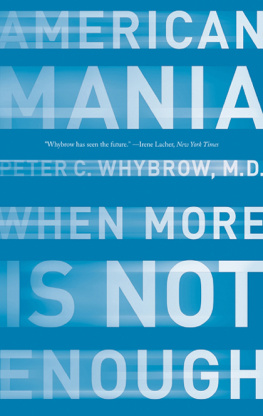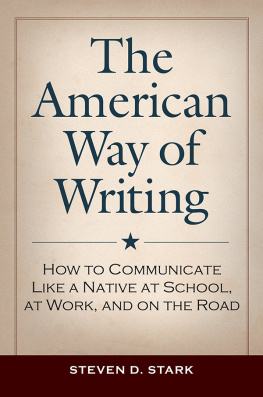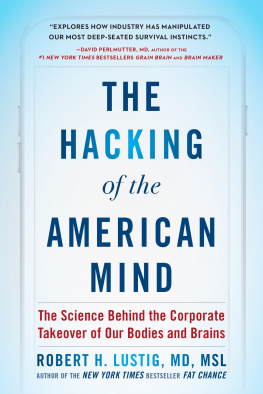
American
MANIA
When More Is Not Enough
Peter C. Whybrow

W. W . NORTON & COMPANY
NEW YORK LONDON
Copyright 2005 by Peter C. Whybrow, M.D.
All rights reserved
Printed in the United States of America
First published as a Norton paperback 2006
For information about permission to reproduce selections from this book, write to Permissions, W. W. Norton & Company, Inc., 500 Fifth Avenue, New York, NY 10110
Manufacturing by The Haddon Craftsmen, Inc.
Book design by Lovedog Studio
Production manager: Amanda Morrison
LIBRARY OF CONGRESS CATALOGING-IN-PUBLICATION DATA
Whybrow, Peter C.
American mania : when more is not enough / Peter C. Whybrow. 1st ed.
p. cm.
Includes bibliographical references and index.
ISBN 0-393-05994-4 (hardcover)
1. Social valuesUnited States. 2. WealthSocial aspectsUnited States.
3. Consumption (Economics)Health aspectsUnited States.
4. Self-interestUnited States. 5. Social ethicsUnited States. 6. Happiness.
7. National characteristics, AmericanHistory. I. Title.
HN90.M6W55 2005
301'.0973dc22
2004018699
ISBN-13: 978-0-393-32849-3 pbk.
ISBN-10 0-393-32849-X pbk.
ISBN 978-0-393-34819-4 (e-book)
W. W. Norton & Company, Inc., 500 Fifth Avenue, New York, N.Y. 10110
www.wwnorton.com
W. W. Norton & Company Ltd., Castle House, 75/76 Wells Street, London W1T 3QT
For my brother,
John William Whybrow
The doctrine of self-interest properly understood does not inspire great sacrifices, but every day it prompts some small ones; by itself it cannot make a man virtuous, but its discipline shapes a lot of orderly, temperate, moderate, careful, and self controlled citizens. If it does not lead to virtue, it establishes habits which unconsciously turn it that way.
Providence did not make mankind entirely free or completely enslaved. Providence has, in truth, drawn a predestined circle around each man beyond which he cannot pass; but within those vast limits man is strong and free, and so are peoples.
Democracy in America , 1835
CONTENTS
Introduction
THE MANIC SOCIETY
Part I
THE AMERICAN TEMPERAMENT: A MANIA FOR PROSPERITY
Chapter One
ADAM SMITHS AMERICAN DREAM: OF DESIRE AND DEBT
Chapter Two
CURIOSITY AND THE PROMISED LAND: OF ORIGINS AND OPPORTUNISM
Chapter Three
THE FREEDOM TO STRIVE: OF RISK AND REWARD
Part II
OVER THE TOP: PROSPERITYS PARADOX
Chapter Four
AMERICA BUBBLES OVER: OF GLOBALIZATION AND GREED
Chapter Five
A GROWING BURDEN: OF APPETITE AND ABUNDANCE
Chapter Six
THE TIME TRADE: OF CLOCKS AND COMPETITION
Part III
MORE IS NOT ENOUGH: PROSPERITY RECONSIDERED
Chapter Seven
DREAMS FOR SALE: OF CULTURE AND COMMERCE
Chapter Eight
THE ROOTS OF HAPPINESS: OF COMPASSION AND COMMUNITY
Chapter Nine
FINDING BALANCE IN THE AGE OF THE MERCHANT: OF SELF AND SOCIETY
THIS BOOK BEGAN IN conversation with friends and colleagues, during those frenzied years of the stock-market bubble in the late 1990s. At times our discussions were spirited, even rancorous. Just what was happening in America and to American culture? we asked. Frequently there were as many opinions as there were people around the table. But it is to those friendly arguments that I now owe gratitude, for they forced reflection on my experience as a migrant in America and triggered my investigation of what we can learn about ourselves from these revolutionary times.
It is impossible to thank individually each of those who have contributed to the facts, insights, and opinions that I express in these pages, but there are some who were particularly tolerant as I tested my emerging ideas. First, I thank Nancy Main for her partnership, love, and forbearance. David Gregory, Pam Cummins, Brad Lovette, and Paula Golden have been stalwart in their support and in their contributions to content, while the gracious hospitality of Anna and Hans Wirz, and the Tuscan solitude of the Villa di Monte, helped guide the initial creative process. My special thanks go to Gordon and Fern Wilder and to all those who enthusiastically gave of their time in contributing personal stories to these pages. Also Lynn Fairbanks, Nga Mai, Susan Goldy, Sasha Bystritsky, Pierre Caland, Peter Loge, Eva Redei, Andy Leuchter, and Bob Stein were especially generous in sharing their experience and in critiquing parts of the manuscript during preparation.
In the research department, Pam Crespin, anthropologist, and Maureen Silos, sociologist, provided able assistance, advice, and friendship while quietly filling in the blank spaces that I discovered in my own education. Sally Arteseros and Helen Whybrow, as in the past, offered indispensable editorial guidance and consistent encouragement. And in that latter regard I owe thanks to Zoe Pagnamenta, a friend who believed in the project from the beginning. I am indebted to Michelle Tessler at the Carlisle Agency for her gentle care and counsel, to Gill Coleridge for her sage advice, and to Don Lamm, who was there when I needed him. But it was Angela Von der Lippe, truly an angel, who with the able assistance of Alessandra Bastagli and the extraordinary team that is W. W. Norton turned this book into a reality. For Angelas intelligence, kindness, and efficient editorial leadership, I am deeply grateful.
Finally, without the help of my colleagues at UCLAs Neuropsychiatric Institute, this book probably would not exist. My many friends there have taught me many things and I thank them all. But I am especially grateful for the affection of Fawzy Fawzy and of Sharon Chavez, who together made it possible for me to secure the necessary time to complete the project. Theirs was an essential gift.
IN THE MANIC PURSUIT that passes for modern-day life, America is ahead of the game.
In American Mania: When More Is Not Enough, I call into question this consumer-driven frenzy and offer a cautionary tale for those who strive to live an intelligent and happy life. This seems to have precipitated a sense of moral indignation in a small minority of American readers and the accusation that, as an English-born immigrant only thirty years off the boat, I have yet to appreciate the value of markets and the American way of life. Indeed, it is true that in no society is the market so deeply embedded in everyday existence as it is in the United States. But as a physician and a student of human behavior that is exactly what has worried me.
In American culture, the market is worshiped increasingly as an ideology rather than being seen for what it isa natural product of human social evolution and a set of valuable tools through which we may shape a healthful and equitable society. It is under the spell of this ideology this new religionthat we have fallen into complacency. Personal profit is no longer the means to an end but has become the end in itself. Americas traditional immigrant values of resourcefulness, thrift, prudence, and an abiding concern for family and community have been hijacked by a commercially driven, all-consuming self-interest that is rapidly making us sick.
With globalization, and at a time of Americas commercial dominance, this hijacking is now emerging as an issue of worldwide concern. For example, demand-driven mass-market economies are growing in Europe, and working hours are lengthening, particularly in the United Kingdom where social trends are beginning to follow the American pattern. The British now work on average 8.7 hours a day, compared to 7.9 hours in France and 7.7 hours in Italy. Similarly, the British are moving closer to the American norm in taking shorter vacations. For this extra effort Britons have a slightly higher disposable income than do the Germans or the French, but they are also saving less. Again similar to the American pattern, obesity has quadrupled in England in the last twenty-five years. The average household now spends the same on fast foods as it does on fresh fruits and vegetables, with the major growth being in food-to-go and snacks for childrens lunch boxes. This cultural shift is symptomatic of the same time-starved addictive mania that plagues the United States.
Next page












